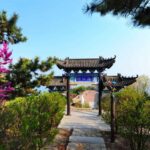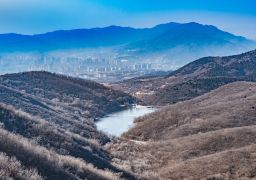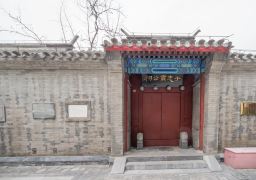Cangnan Wan Yao Scenic Area is situated within the territory of Qiaodun Town in Cangnan County. This picturesque village by the valley stream was a production base for coarse porcelain used by civilians in southern Zhejiang during the Ming and Qing dynasties. The scenic area is not highly developed, with ceramic workshops and old residences and stages in the Ming and Qing styles still retaining their original appearance. Many local people live here, and there are not many tourists. Occasionally, students who come to sketch can be encountered, giving a sense of being hidden from the world.
The ancient village has two entrances, approximately 3.5 kilometers apart. The minibus stops by the bridge at the secondary entrance, and after crossing the bridge, it is only a five or six hundred meters’ walk to the ticket office. The attractions in the village can be roughly divided into two parts: the ancient village itself, with its old houses and ancient kilns, and the natural landscape represented by the Sanzhe Waterfall to the west. Although there are often only a few scattered visitors, a reasonable walking path has been planned in the village, allowing tourists to visit all the main attractions by following the path in a large loop, which takes about two to three hours.

After entering the scenic area and heading west towards the main entrance at the village entrance, the first stop is the Wan Yao Museum. The museum is converted from the ancestral home of the Zhu family. In this two-story ancient building, one can see various types of pottery bowls, plates, wine pots, and so on, produced by the locals over the generations, as well as an introduction to the pottery process for understanding.

At the top of the plank road is a path, and behind it is a water channel walking path leading to the ancient village, with a total length of about 1.5 kilometers. The wooden path winds around the hillside, accompanied by the murmuring water flow. Looking around, one sees the Wan Yao ancient village surrounded by mountains and waters, creating a peaceful and beautiful scene. At the end of the path is the part of the ancient village where the attractions are more concentrated.

The rest of the tour focuses on appreciating the cultural landscape of the village. Most of the houses here are built with stone blocks or wooden structures, with red lanterns hanging from the eaves. Against the backdrop of the distant green mountains, the photos taken exude an additional sense of antiquity. There are a few farmhouse restaurants in the village to solve the dining problem, and some families sell some dry goods from the mountains. Fortunately, there are not many tourists, so there is not much of a supply and demand issue.
Open all year round from 08:00 to 16:00.
Preferential policies for children: Free for children aged 6 years old (inclusive) or below 1.2 meters (inclusive) in height, with legal identification documents such as household registration books or identity cards proving their age and identity; Half-price for minors aged 6 years old (exclusive) to 18 years old (inclusive), with legal proofs like identity cards or household registration books; Half-price for youth from Hong Kong, Macao, and Taiwan with valid travel permits.
Preferential policies for the elderly: Free for those aged 70 years old (inclusive) or above, with legal documents such as identity cards or senior citizen cards proving their age; Half-price for those aged 60 years old (inclusive) to 70 years old (exclusive), with legal documents like identity cards or senior citizen cards.
Preferential policies for students: Half-price for full-time undergraduate students and below, with student IDs.
Preferential policies for military personnel: Free for military personnel, disabled military personnel, martyrs’ dependents, and dependents of military personnel who died in service, with valid military-issued identification documents.
Preferential policies for firefighters: Free for active and disabled firefighters and fire academy students, with valid identification documents.
Preferential policies for the disabled: Free with a Disability Certificate issued by the Disabled Persons’ Federation.
Preferential policies for teachers: Free for teachers who have taught for thirty years, with a certificate issued by the Provincial Department of Education.
Preferential policies for unpaid blood donors: Free for blood donors who have reached the national standard for unpaid blood donation awards or have been awarded the national unpaid blood donation award in this province, with a provincial-level blood donation honor certificate issued by the Provincial Health Commission.
Preferential policies for religious clergy: Free entry for religious clergy and staff of religious activity venues within the scenic area, and for religious clergy and believers of the same religion who have undergone religious ceremonies and hold valid identification documents.
Essential tips: There are many mosquitoes on the mountain, so it is recommended to wear long pants and take mosquito prevention measures during the visit.









